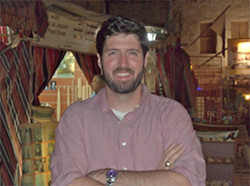History Spotlight - April 2016
 David Graff, associate professor of history, is the author of a new book. Routledge Press has published The Eurasian Way of War: Military Practice in Seventh-Century China and Byzantium as part of its “Asian States and Empires” series. The book offers a comparative study of military practices between China and the Byzantine Empire during the period 600-700 C.E. Through his comprehensive exploration of an array of military practices, Professor Graff underscores remarkable similarities between the Chinese and Byzantine empires’ approach to warfare. He concludes that the vast common ground shared by each empire’s “way of war” was not the result of cultural diffusion or shared cultural influences, both of which were extremely limited between the two empires. Instead, Professor Graff identifies these striking parallels as the consequence of each empire’s independent effort to confront what were, in fact, common problems and common enemies emerging from the separate challenges and threats posed by the nomadic peoples of the Eurasian steppes. Professor Graff’s conclusions are notable because he is challenging the view, widespread among military historians, that there are quite distinctive "Western" (European) and "Eastern" (Chinese) ways of war that are deeply rooted in the respective cultures and almost impervious to change over time. Alternatively, Professor Graff concludes that pragmatic needs and choices are, in fact, more significant than shared cultural imperatives in shaping a society’s “way of war.”
David Graff, associate professor of history, is the author of a new book. Routledge Press has published The Eurasian Way of War: Military Practice in Seventh-Century China and Byzantium as part of its “Asian States and Empires” series. The book offers a comparative study of military practices between China and the Byzantine Empire during the period 600-700 C.E. Through his comprehensive exploration of an array of military practices, Professor Graff underscores remarkable similarities between the Chinese and Byzantine empires’ approach to warfare. He concludes that the vast common ground shared by each empire’s “way of war” was not the result of cultural diffusion or shared cultural influences, both of which were extremely limited between the two empires. Instead, Professor Graff identifies these striking parallels as the consequence of each empire’s independent effort to confront what were, in fact, common problems and common enemies emerging from the separate challenges and threats posed by the nomadic peoples of the Eurasian steppes. Professor Graff’s conclusions are notable because he is challenging the view, widespread among military historians, that there are quite distinctive "Western" (European) and "Eastern" (Chinese) ways of war that are deeply rooted in the respective cultures and almost impervious to change over time. Alternatively, Professor Graff concludes that pragmatic needs and choices are, in fact, more significant than shared cultural imperatives in shaping a society’s “way of war.”
 The scholarship of K-State History doctoral alumnus Brian Laslie has been recognized by the U.S. Air Force. Dr. Laslie, who is currently the Deputy Command Historian at the U.S. Northern Command for the U.S. Air Force, completed his Ph.D. in 2013 under the supervision of major professor Donald Mrozek. The University of Kentucky Press published Dr. Laslie’s revised dissertation in 2015 under the title The Air Force Way of War: U.S. Tactics and Training After Vietnam. The U.S. Air Force has now selected this study to appear on the list of books specially recommended to all in the Air Force by the Chief of Staff of the U.S. Air Force. Dr. Laslie’s study explores the transformation of pilot instruction and training in the aftermath of the Vietnam War. He underscores that the effort to apply the presumably best technological innovations of the day into an instructional program that provided a “realistic” experience was very particular to the era and organization of which it was a part. Part of what distinguishes Dr. Laslie’s scholarship from other scholarship in military history is his application of approaches the history and philosophy of technology to make sense of the Air Force as both a military and educational institution. He shows how inspirations for innovation, processes of development, unexpected uses for and unintended consequences of are all the result of how political, legal economic, institutional, social, and cultural factors shaped the development and uses of technology and technological systems within the U.S. Air Force.
The scholarship of K-State History doctoral alumnus Brian Laslie has been recognized by the U.S. Air Force. Dr. Laslie, who is currently the Deputy Command Historian at the U.S. Northern Command for the U.S. Air Force, completed his Ph.D. in 2013 under the supervision of major professor Donald Mrozek. The University of Kentucky Press published Dr. Laslie’s revised dissertation in 2015 under the title The Air Force Way of War: U.S. Tactics and Training After Vietnam. The U.S. Air Force has now selected this study to appear on the list of books specially recommended to all in the Air Force by the Chief of Staff of the U.S. Air Force. Dr. Laslie’s study explores the transformation of pilot instruction and training in the aftermath of the Vietnam War. He underscores that the effort to apply the presumably best technological innovations of the day into an instructional program that provided a “realistic” experience was very particular to the era and organization of which it was a part. Part of what distinguishes Dr. Laslie’s scholarship from other scholarship in military history is his application of approaches the history and philosophy of technology to make sense of the Air Force as both a military and educational institution. He shows how inspirations for innovation, processes of development, unexpected uses for and unintended consequences of are all the result of how political, legal economic, institutional, social, and cultural factors shaped the development and uses of technology and technological systems within the U.S. Air Force.
